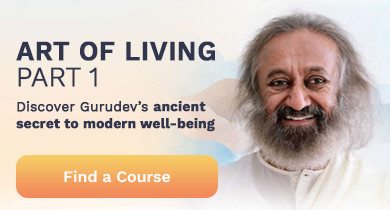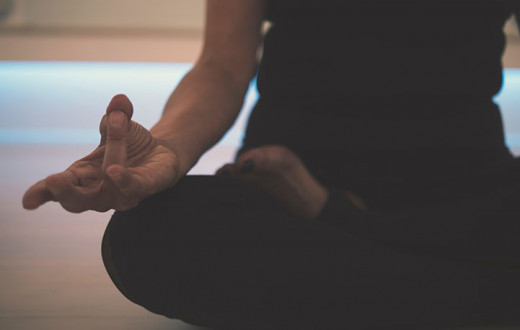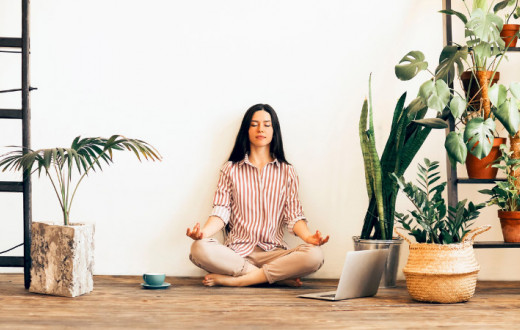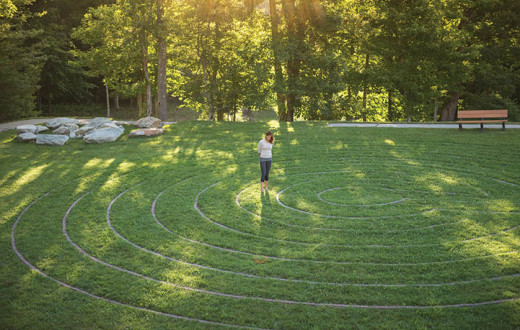
There may be many reasons why you are reading this article. Chances are that you are struggling with sleep issues. You might struggle with difficulty falling asleep. You may not be happy with your sleep quality. Or, you could be sleep-deprived. Whatever your struggle is, you are likely looking for an aid to help you sleep better.
In this article, I’ll share how meditation promotes relaxation, helps you fall asleep more easily, and improves the quality of your sleep.
Insomnia and the alarming sleep statistical data
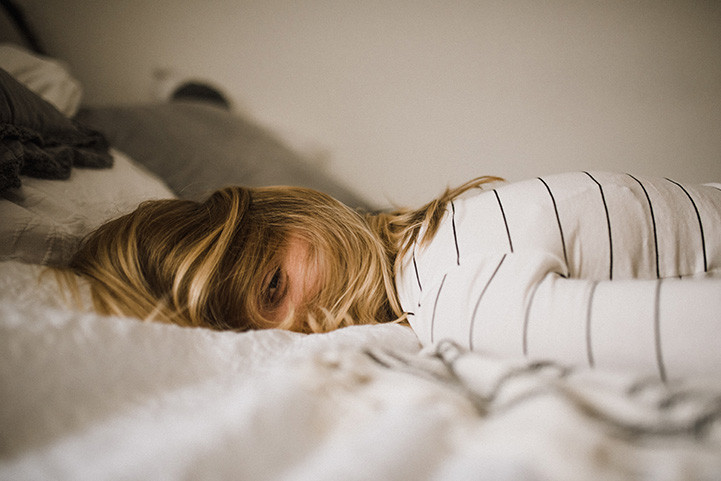
Insomnia is a sleep disorder characterized by poor sleep or sleeplessness. It can happen for many reasons, like an overactive mind, stress, anxiety, depression, hormonal changes, chronic pain, or sleep apnea. When you don't sleep well, it can exacerbate these problems. This creates a tiring cycle of not enough sleep and feeling fatigued during the day.
A 2016 study by the Centers for Disease Control and Prevention found that 50 to 70 million adults have a sleeping disorder. Women report insomnia more often than men, but that doesn’t mean men don’t also struggle to fall asleep.
Benefits of guided sleep meditation

Guided meditation aims to lessen worrying thoughts and tension in your body and mind. This helps you relax and rest more deeply. Letting go and relaxing your body can help you sleep better. You'll notice it easier to fall asleep faster and stay asleep.
Guided sleep meditation allows you to let go of the thoughts that are swirling and thus to rest your mind. This activates your parasympathetic nervous system. It helps lower your heart rate and slows your breathing rate. These changes help you get ready for sleep. You might even drift off during the meditation.
Getting enough sleep at night impacts how you feel during the day. You’ll also see daytime benefits from guided sleep practice. These benefits include increased energy, sharper focus, and enhanced concentration, among others.
How to use guided sleep meditation and what to expect
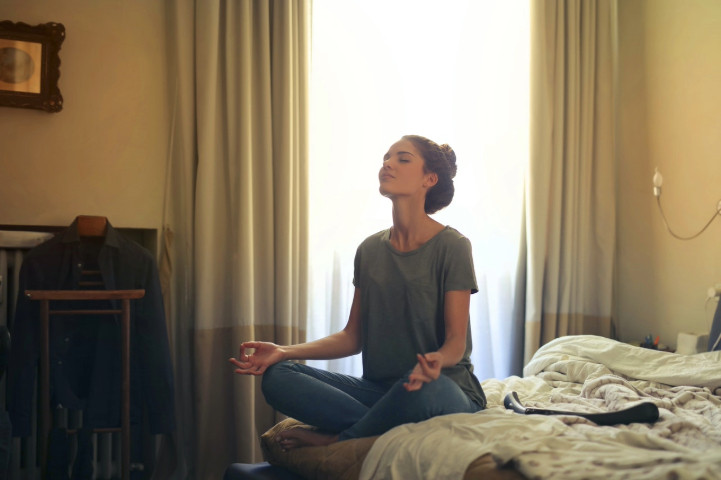
Guided sleep meditation is usually practiced while lying in bed at the end of the day and involves listening to an audio recording.
You can use a meditation app like the Art of Living Journey App or the Sattva app. Both apps offer guided meditations and helpful sleep support content.
Meditation for sleep should be practiced in the same manner as any other meditation. Take it easy, stay relaxed, and don’t force yourself to sleep. Otherwise, you may encourage more thoughts and possibly some tension. Let the guidance lead you. Don’t focus on the technique or instructions. Relax your body and let your mind drift softly.
Typically, guided sleep meditation will give you enough relaxation to fall asleep, but may not contribute to staying asleep or increasing how deep your sleep is.
Guided sleep meditation as a quick sleep aid
Yoga Nidra or body scanning: This technique helps you let go of stress in your body. It can also help you fall asleep more easily. It can also be used as a power nap during the day. Get comfy in bed. Keep the volume low and set it to stop automatically when done.
Progressive muscle relaxation: This method can be guided or practiced unguided. Simply start at your feet, isolating groups of muscles. Tighten the area and hold your breath, then release and exhale simultaneously. Progressive muscle relaxation typically moves up from the feet to the head.
Gratitude meditation: This meditation technique is similar to loving-kindness practices. It encourages you to recognize your blessings and build a sense of gratitude. Remembering your successes from the day can help you feel a sense of satisfaction. Instead of climbing into bed with complaints, greet sleep with gratitude or prayers.
Reflecting on your day: Review your day in detail, action by action. This can be a great way to distract your mind from the bombardment of thoughts. Thinking about what you achieved during the day can bring you joy. Remembering your day in reverse sequence, from bedtime to when you first woke up, is a great way to start winding down.
Meditation for sleep: What the research says

Getting restful sleep can be tough, especially when you're dealing with stress and anxiety. It’s difficult to calm your mind. Most of the issues around sleep begin with your overthinking processes at night. This is where meditation techniques can be particularly helpful. Techniques offer deeper relaxation and significant stress reduction.
According to the Sleep Foundation, “If insomnia is at the root of your sleepless nights, it may be worth trying meditation. The deep relaxation technique helps you sleep longer and better. It also makes it easier to fall asleep and stay asleep.”
Meditation techniques offer many science-backed benefits. One key benefit is an increase in melatonin. This hormone helps improve sleep quality. Studies on meditation techniques, such as SKY Breath Meditation, have shown significant benefits for sleep. Meditation can improve sleep quality and quantity. You may fall asleep faster and feel more energetic during the day.
Independent research shows that people who practice SKY Breath Meditation spend 13% of their total sleep in a deeper restful state known as SWS (stages 3 and 4 sleep). In contrast, the control group spent only 4% of their time.
How SKY helps with aging-related sleep issues
Watch this video. Ronnie Newman, Director of Research at the Art of Living Foundation, shares how SKY Breath Meditation helps you relax and gives you enhanced deep sleep.
When we reach about 40 years of age or so, we spend less time in the deeper stages of sleep than those who are younger than us. Studies suggest that SKY Breath Meditation helps people in their forties regain a more youthful sleep pattern. It effectively turns back the sleep clock. As a result, they have significantly more time in the deeper stages of sleep than their peers.
Sleep better with SKY

The quality of your sleep and your sleep patterns depend on your mind and lifestyle. So, improving them takes more than just a quick meditation in bed. Instead of using meditation solely for sleep or as a quick fix, try making it a regular part of your routine. This way, you can enjoy its many benefits. This may prove to be a permanent solution to your sleeping problems. Practicing meditation regularly can improve your mind. As a result, it can enhance your life and help you sleep better.
The Art of Living’s SKY Breath Meditation course doesn’t aim to put you to sleep. Instead, it seeks to transform your relationship with sleep and enhance your life. By eliminating deeply rooted stress and unresolved impressions, day by day, you gradually create an inner environment conducive to restful sleep at night. SKY practitioners report enjoying sound sleep and deep rest after just one session.
Sleep hygiene tips to support your quest for restful sleep

People have been discussing sleep hygiene a lot lately. It’s key for better sleep quality and helps you wake up more easily. Here are some easy sleep hygiene tips to try if you’re having trouble falling asleep:
Limit the use of blue-light devices in the last hour before bed, such as cell phones and computers
Say no to YouTube videos, games, social media, and streaming movies at night
If you like, you can play some soft and relaxing instrumental music in the evenings to shift into a relaxation mode
Avoid any caffeinated drinks after 3 or 4 pm
Keep your bed neat and clean
Follow your body’s natural circadian rhythm (Go to bed at the same time each night and wake up consistently)
Keep your bedroom at a cooler temperature for better sleep
Allow some fresh air to circulate in your room
Minimize sound in your bedroom (other than white noise, if needed)
Eat healthily and drink 6 to 8 glasses of water each day
Drink some warm milk with turmeric before bedtime
Include regular exercise, such as walking or yoga, in your daily routine
Wear comfortable pajamas, like cotton, that are breathable
Write in a gratitude journal or say your prayers before bed
Enjoy restful sleep today: take the first step before you go to bed

We hope that you find this helpful article. The ultimate sleep remedy when you're having difficulty falling asleep is SKY Breath Meditation. To learn SKY and start enjoying enhanced deep sleep, register for the Art of Living Part 1 course here.
Enjoy your Zzzz’s! Wishing you a peaceful, restful sleep tonight and every night!
Related articles

Better Sleep with Melatonin Alternatives: Here’s What You Need to Know
How to Sleep Better: 6 Tips If You Feel Tired All the Time
Meditation Sleep Music To Help You Beat Insomnia and Get Some Shut-Eye
How to Fall Back to Sleep and Feel Rested in the Morning
Beauty Sleep: More than Skin-Deep and More Important than You Think
Sleep Tips from an Ayurvedic Practitioner and Former Insomniac
How to Fix Your Sleep Schedule for Improved Rest
Yoga Nidra for Sleep: How to Sleep Better Tonight
Can Meditation Replace Sleep? Find Out Before You Try It!
Are You Meditating or Sleeping? Understanding the Key Differences
Meditation: A Natural Remedy for Insomnia and Better Sleep
What is Restless Sleep? 5 Methods for Managing With It
Meditation for Sleep: Relaxation Techniques for Body and Mind
Disclaimer: This content on the Art of Living Blog is not intended to be a substitute for professional medical advice, diagnosis or treatment. Always seek the advice of your physician or other qualified health providers with any questions you may have regarding a medical condition. Any links to third-party websites are provided as a convenience only and the Art of Living Blog is not responsible for their content.

